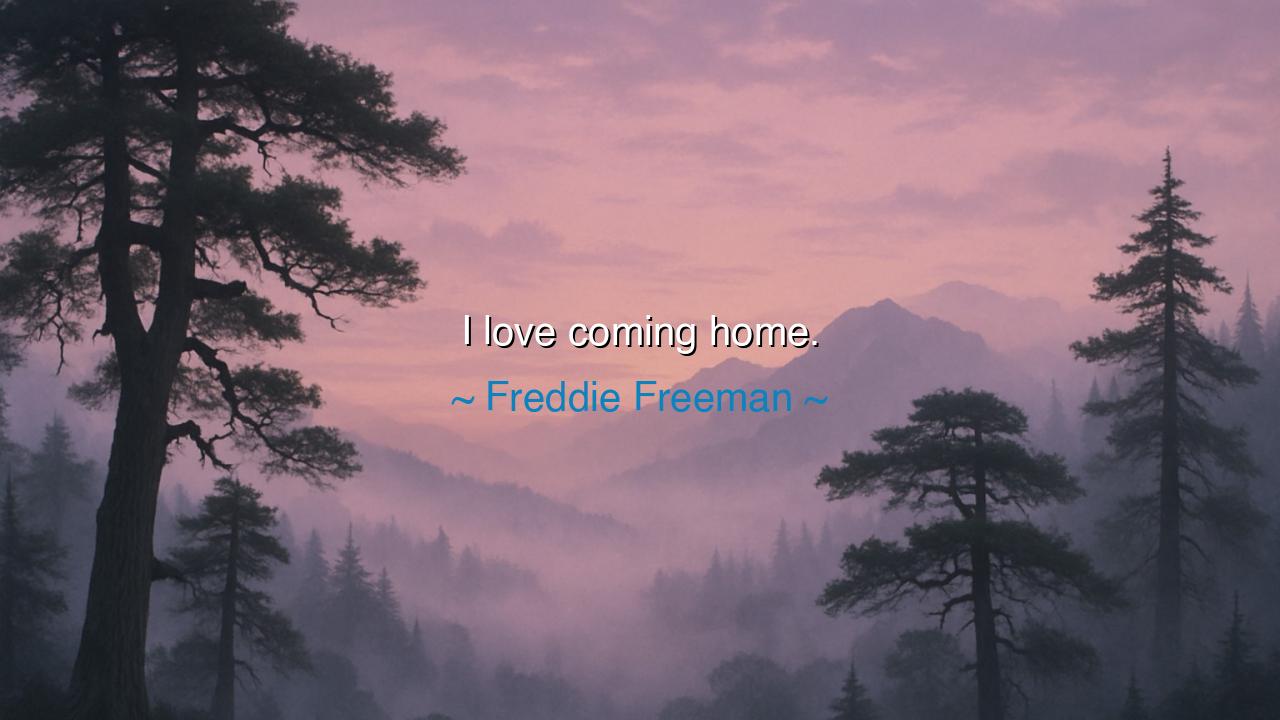
I love coming home.






In the spare, shining words of Freddie Freeman—“I love coming home”—we hear a vow older than any stadium roar. To say I love is to set the heart’s compass; to say coming home is to name the direction of its needle. The ancients called this longing nostos, the blessed return; sailors carved it into the wood of their oars and mothers stitched it into their children’s cloaks. For what is home if not the harbor where the oars are finally lifted, where the dust loosens from our sandals, where our name is spoken without performance?
There is a holiness in the ordinary door. The world hurls us into contests—scoreboards, ledgers, deadlines—but home is the first country and last sanctuary. When a craftsman crosses that threshold, the chisel is no longer a measure of worth; love is. When an athlete hangs the jersey by the kitchen light, the statistics grow quiet and the laughter of a child becomes the only chant that matters. Thus, “I love coming home” is not an aside; it is a creed. It means work is real, but belonging is ultimate.
The old stories understood. Odysseus’s glory was not merely in surviving storms or outwitting giants; it was in returning to the bed carved from a living tree, to the dog who remembered his scent, to the queen who knew his scar. The journey forged skill, but home restored identity. So too for us: the road may sharpen us, the arena may test us, but coming home re-members us—gathers our scattered pieces and fits them back into a whole.
Consider a modern parable. A nurse named Linh worked endless nights through a winter of illness. Fluorescent corridors blurred; the clock betrayed her with its slow mercy. Each morning, she would walk up a stairwell that smelled faintly of rain and rice. At her door, a paper crane waited—folded by her father before he left for work, a small covenant of care. Inside, her mother warmed broth, her brother set out tea without a word. In that modest ritual she was repaired. Her hands, trembling from alarms and sorrow, steadied. When she later told her friends, she only said, “I love coming home.” It did not erase the weight of the ward; it gave her the strength to lift it again.
Even the world’s heroes have needed such return. Consider the great mathematician Ramanujan, who crossed oceans with notebooks of thunder. Far from his birthplace, illness shadowed him; yet letters, recipes, remembered prayers—the small architecture of home—tethered his mind to meaning while his work remade parts of the heavens. Triumph is louder with a crowd, but endurance is learned in kitchens, at tables, in the simple rites of presence. Home is where effort becomes story, and story becomes strength.
This love of coming home is not mere comfort-seeking; it is moral training. At home we practice the gentle disciplines that power the public life: saying thank you before we compete, cleaning the tools before we boast, holding silence before we speak. A person who honors the threshold honors the field; a team that knows its home knows why victory matters and why defeat does not define. The hearth is not an escape from duty; it is the forge that tempers it.
Here is the teaching to carry forward. First, defend your threshold: make one daily ritual that signals return—shoes set neatly, phone set aside, a breath at the doorway. Second, build a “house of memory”: keep three tokens in view (a photo, a recipe, a worn glove) that remind you who you are when the world forgets. Third, speak blessing over your rooms: once a week, name aloud what home has given—rest, repair, love—so that gratitude keeps the floor strong. Fourth, when you are far away, send a thread back: a call, a note, a prayer, so the road never convinces you that you are rootless.
Do these, and you will learn the hidden arithmetic in Freeman’s sentence: when home is honored, labor becomes lighter; when coming home is cherished, going out gains purpose. May your door swing on quiet hinges. May your table hold the bread that tastes of belonging. And may you be able to say, with a full and steady heart, I love coming home—and mean not merely arrival, but the restoration of your truest self.






AAdministratorAdministrator
Welcome, honored guests. Please leave a comment, we will respond soon